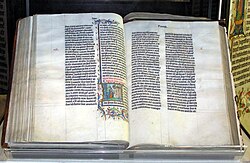
| Part of a series on |
| Oriental Orthodoxy |
|---|
 |
| Oriental Orthodox churches |
| |
The Orthodox Tewahedo biblical canon is a version of the Christian Bible used in the two Oriental Orthodox Churches of the Ethiopian and Eritrean traditions: the Ethiopian Orthodox Tewahedo Church and the Eritrean Orthodox Tewahedo Church. At 81 books, it is the largest and most diverse biblical canon in traditional Christendom.
Contents
- Narrower canon
- Old Testament
- New Testament
- Broader canon
- List of books in the Orthodox Tewahedo Bible
- In the Old Testament
- In the New Testament
- In the Church Order
- See also
- Footnotes
- Further reading
- External links
Western scholars have classified the books of the canon into two categories — the narrower canon, which consists mostly of books familiar to the West, and the broader canon, which includes nine additional books.
It is not known to exist at this time as one published compilation. Some books, though considered canonical, are nonetheless difficult to locate and are not even widely available in the churches' home countries of Ethiopia and Eritrea. [1] [2]


